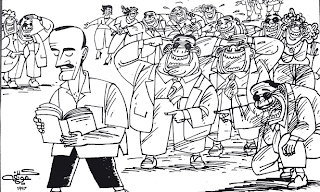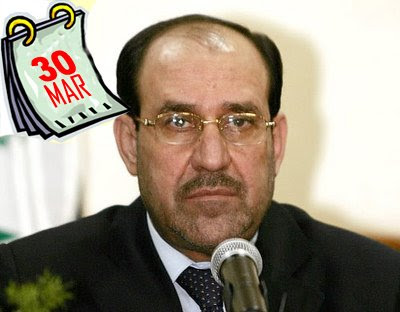قل للمليحة في الخمار الأسود ماذا فعلت بناسك متعبد؟
قد كان شمر للصلاة ثيابه حتى وقفت له بباب المسجد
ردى عليه صلاته وصيامه لا تقتليه بحق دين محمد
قد كان شمر للصلاة ثيابه حتى وقفت له بباب المسجد
ردى عليه صلاته وصيامه لا تقتليه بحق دين محمد
the hero of this story is a poet called Miskin al-Darmi, who is an Umayyad-era Poet, who died in 90 AH.
SCENE: Medina.
al-Darmi in his house, with an Iraqi friend named Sulayman al-Baghdadi.
Darmi: Good going, dude, we managed to stay the whole night worshiping in the mosque.
Baghdadi: You know man, I wasn't worshiping in sincerity, but I had nothing else to do.
Darmi: What, you sold all your stock?
Baghdadi: Well, yes, except for the black burqaas, which constitute 4/5 of my goods.
Darmi: Why did you buy so much of these?
Baghdadi: Well because women in Iraq have taken it in fashion these days, so I thought it would be fashionable for the women of Medina.
Darmi: So what are you going to do now?
Baghdadi: Man, I'm in such a bad streak, ever since I stopped getting drunk at parties I've never seen anything good come to me. I've put all my money in these veils and now all I got to do is go back to Iraq and declare bankruptcy.
Darmi: Wait, I've got just the thing for you.
The next day al-Darmi sheds down his worshiping robes and dons partying clothes. his wife Jaleela is dumbfounded.
Jaleela: What the fudge are you doing? What do you think people are going to say?
Darmi: They'll say: al-Darmi reverted back to his old indecent ways and abandoned the path of worship.
Jaleela: and you like that?
Darmi: Whatever, I've decided to go back to what I was, it's more like me.
Jaleela: Woe to you!
Darmi: Don't worry, I'll be back poring over the Qur'an in no time.
Jaleela: Yeah right, you're going to spend your days writing indecent love poems and odes to those sultry concubines and then you come to me late at night, drunk and haggled, no sir, I'm going to my parents' house.
A party in the house of Abu Ayman, his concubines are led by the Singer Lamyaa, who sings some verses of al-Darmi's
Abu Ayman: Hit them with the new tune, Lamyaa.
Crowd: Yes, please, we want the new hit tune.
Lamyaa: I'm not going to sing it until I get the black burqaa.
Abu Ayman: I've had the boy go pick it up since early morning, and I don't know why it took him so long.
Ibn Suraij The Oud player: Here he comes at last!
Boy: Here's the black Burqaa, sir.
Abu Ayman: God curse your black face, what took you so long?
Boy: My good sir, look at my clothes, they're torn from the severe crowding and fights I've had to get into in order to get this burqaa. Everybody in town is buying those burqaas from the Iraqi merchant.
Ibn Surayji: So now you have your burqa, Lamyaa.
Lamyaa (dons it): How do I look in this?
Abu Ayman: By God! I never thought a black Burqa would look this good on anyone.
Crowd: So hit us with the tune now.
Lamyaa sings and Ibn Surayj plays:
Ask that beauty in the black burqa
What has she done to this obedient saint?
He was getting ready to pray, yet
her sight by the mosque door, made him faint
Leave him to his fasting and his prayers
By Mohammed's religion! leave him to his restraint
What has she done to this obedient saint?
He was getting ready to pray, yet
her sight by the mosque door, made him faint
Leave him to his fasting and his prayers
By Mohammed's religion! leave him to his restraint
Abu Ayman: Dance to it Lamyaa, it's made for dancing!
Lamyaa re-sings the verses while dancing, getting everybody visibly excited.
***
Darmi: Come back to me Jaleela, I've abandoned my marauding ways.
Jaleela: Look at this hypocrite, now that he's made a mockery out of himself he wants me back!
Her mother: Yes, everybody is talking about him these days.
Her father: Why did you do this to yourself?
Darmi: I'll tell you why.
Somebody outside sings: Ask the beauty in the black burqaa/what has she done....
Jaleela: Listen to this mother! Look, why don't you go back to your black burqaa beauty and leave me alone.
Darmi: There is no such girl, don't you people know the Iraqi merchant Sulayman? Haven't you seen that every woman in town has bought his Iraqi black burqas until there's none left?
Jaleela's father: Yes, even your wife begged me to buy one for her.
Darmi: Really? you wanted to be the Black Burqa Beauty yourself?
Jaleela: No, but I saw everybody do it so I did it myself.
Darmi: You see? I did what I did only so that I can help my Iraqi friend sell his undesirable black burqas! He's even sent for his dealer in Iraq to bring him more of them, they're selling like hot cakes.
Translated from the play by Ahmed Ali Bakthir, which is based on a true story.
The verses are famous, and they're still sung until today, most recently by an Egyptian fusion? band with some western influences called Wust il Balad.
This is the first installment of my Arabs First Created series.



